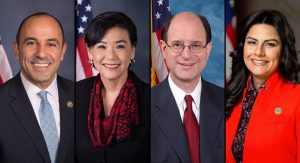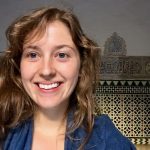ACE Spectrum
ACE Spectrum
Ace Spectrum is about you — the ACE Learning Centers.
It’s a quick sharing of ideas, inspiration, opinions and best practices among our continuing education organizations.
Please join the conversation.
Collaboration Builds Community in the KALW Newsroom and Beyond
By Ben Trefny, News Director, KALW Audience Supported Public Media and Annelise Finney, Audio Academy ‘21
I think a lot of us were hoping that 2021 would start fresh and promising. But so far, it feels a lot like 2020 to me.
That said, in the continuing COVID-19 pandemic, the economic instability of stop-and-go shutdowns, the overdue racial reckoning, and the toxic politics we’ve been experiencing, I feel we’re all learning countless lessons: about growing; priorities; community; and building a better world.
As part of that, I’m very grateful for support from the Association for Continuing Education, which has always prioritized those values.
I’d like to highlight a story that our training coordinator, Marissa Ortega-Welch, and I produced the day after the attack on the U.S. Capitol. It’s a firsthand account of the day’s events from the perspective of four elected officials from California.

U.S. representatives Jimmy Panetta, Judy Chu, Brad Sherman, and Nanette Barragan (from left to right).
While our team turned this story around quickly, within 24 hours of the insurrection, it was the result of a journalism partnership. We received the interviews from two public radio stations that partner with us in NPR‘s California Hub — KPCC in Pasadena and KAZU in Monterey. This kind of collaboration, done in the public interest, is exactly the kind of effort that I’ve hoped for years to achieve. Working together toward a common goal makes our work better. It makes us all better. Here’s to more of that in this challenging year to come.
Here are some thoughts from Annelise Finney, one of the outstanding fellows in KALW’s Audio Academy class of 2021:
I’m wrapping up work on my first feature length audio piece, a profile of a librarian who became a contact tracer during the pandemic. I made a few audio pieces on my own before joining the Audio Academy, but I’ve never worked on them with another person, much less an editor. For this project I was fortunate to be edited by Lisa Morehouse.
I’ve enjoyed working with Lisa and learning about the reporter/editor relationship. So much of my pandemic pursuits have been intensely and necessarily solitary. I’m usually a very social person but to cope with the isolation of this time, I’ve gotten pretty good at burrowing deep into projects on my own. Each one becomes its own world complete with unique logic, routines, and dramas. Starting work on this project felt the same, but then at my first edit, Lisa dropped into the world beside me.
When someone drops into a world you’ve created, you quickly learn the distance between what you find interesting and what has more general appeal. It’s amazing how easy it is to forget this distance exists when working for a long time on your own. At first I felt a bit shy and it felt strange to have someone look so directly and critically at my work — kind of like having a stranger stare so deeply into your eyes that you can’t help but blush and look away. I was at first, resistant to incorporating another person’s ideas into my work. But I began to learn how to feel out where to acquiesce to the informed opinion of the expert, and where to push back and defend my own ideas. Lisa delivers edits efficiently, with, what was for me, the perfect amount of caring and unsparing honestly. She is the definition of tough love. Lisa’s attention forced me to evaluate my own work with a more critical eye and ultimately pushed me forward on the road to becoming a better journalist. I’m looking forward to working with an editor again, learning about different editing styles and continuing to grow as a journalist through close collaboration with my editors.
In Person to Online Teaching: Learning How to Teach Via Zoom
By Dr. Paul Krivonos, ACE Board Member, Emeritus Professor of Communication Studies at California State University Northridge
ACE Board member Dr. Krivonos is an experienced teaching professional. However, online teaching with Zoom was a learning moment for him. Here is Paul’s story.
Although I have previously taught online, it was always a planned endeavor, and never on Zoom. Back in March 2020, I had to make a very quick, though bumpy transition from in person to online teaching. I was scheduled to teach an eight-week intensive course on Organization Theory and Behavior in the California State University (CSUN) Northridge Master of Public Relations program. Even though the cohort was to meet at an off-campus site, it was still scheduled to be an in-person experience.
At the beginning of March, CSUN decided to move all on-campus classes to online via Zoom. Like everyone else in education (and almost all other fields), I had to quickly adapt from what was comfortable to a new normal as I never had an in-person session with a class.
Holding a class over Zoom was an interesting experience, both for me and for the students. Because I use quite a few experiential exercises to illustrate behavior in organizational settings, I had to rethink that aspect of the course. I did not want to completely eliminate such class interactions, but many of the ones I use in person were not easy to adapt to the online environment. What did work well was putting students in small groups of four to five people and present them with a topic, question, scenario, or case study to discuss and report back to the class as a whole. Students also found this group interaction valuable and enjoyable based on a written informal survey at the end of the course.
Interestingly though, they found an advantage in getting to know their classmates as they would normally arrive prior to class and leave when class finished. Now, because they did not have to spend time commuting to class, they would “arrive” early. I opened the Zoom session 15-20 minutes before class started and would leave the Zoom session open until students had finished chatting with one another after class.
That desire to get to know their classmates was also evidenced in their feedback about small group interactions that occurred during breakout groups during class. As previously mentioned, I adapted to making sure to include experiential experiences was to include guided breakout sessions. An additional advantage from the students’ perspective was that it gave them an additional opportunity to get to know one another better.
Overall, the transition from what was to have been an in-person class to an online class was as much work, though of a different nature, as face-to-face teaching. It also meant that I was able to learn from my successes and missteps so that the next time I taught an online class, it was more effective and satisfying than one where I had to mentally move from anticipating an in-person class to teaching a virtual one.
In the Midst of Tough Year 2020 a KALW Audio Academy Student Finds Her Way to Expertise and Fun
By Ben Trefny, News Director, KALW, Audience Supported Public Media; and Carla Esteves, Audio Academy ‘21
I’ve got a quick blog post to share from Carla Esteves — a member of the Audio Academy class of 2021:
My experience as a Fellow in the Audio Academy has been incredibly rewarding and enriching. It’s also deeply humbling to be able to contribute to the institution that keeps people informed and society functioning more equitably, since it can’t be overstated how essential a free press is to a functioning democracy.
It’s only been less than a handful of months since this year’s program started for the 2020-21 year, but I’ve already learned so much in this short period of time. I credit that to two main things. The first is the way KALW has structured and built the program to accomplish the goal of arming fellows with the expertise of reporting/producing for public radio. Through the Audio Academy, we are given hands-on experience with weekly opportunities to fact-check and report stories for broadcast, paired with mentors who help keep us on track to meet personal goals during the program and offered access to tools and instruction that might otherwise be out of reach. The second is due in large part to the people who keep the station and the program running smoothly. Past Audio Academy Fellow Marisol Medina Cadena’s testimony to the value and excellence of this program puts what I appreciate about them in perfect words: “How often do you find joyful people with the knowledge you crave who are standing there with open arms, ready to share it?”
One notable experience I’ve had — apart from the fact that we are the first (and hopefully last) cohort to be completely online due to a pandemic — is the fact that we all got to work in a newsroom during a major presidential election year. On election night, every fellow was extended the chance to be interviewed about a local measure in real-time live on air by KALW’s News Director, Ben Trefny. What I appreciated most about that opportunity, aside from getting to experience being part of a newsroom during such a consequential election year, was how much trust was put into each of us.
I’m really looking forward to the rest of the program, and it’s exciting that I get to continue on this journey with seven other talented Fellows who also make this experience a lot of fun.


